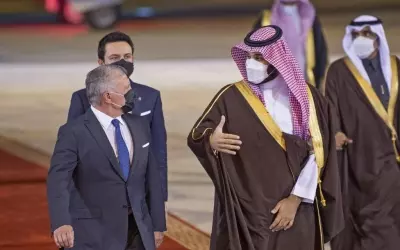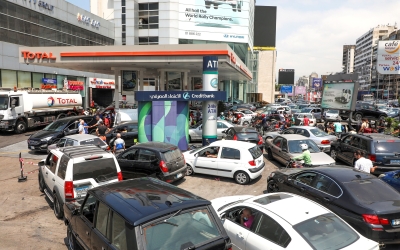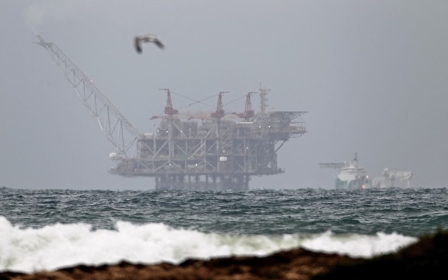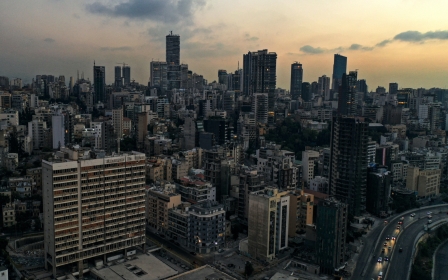'We suffered the most': Jordan hopes for US approval in Syria energy deal
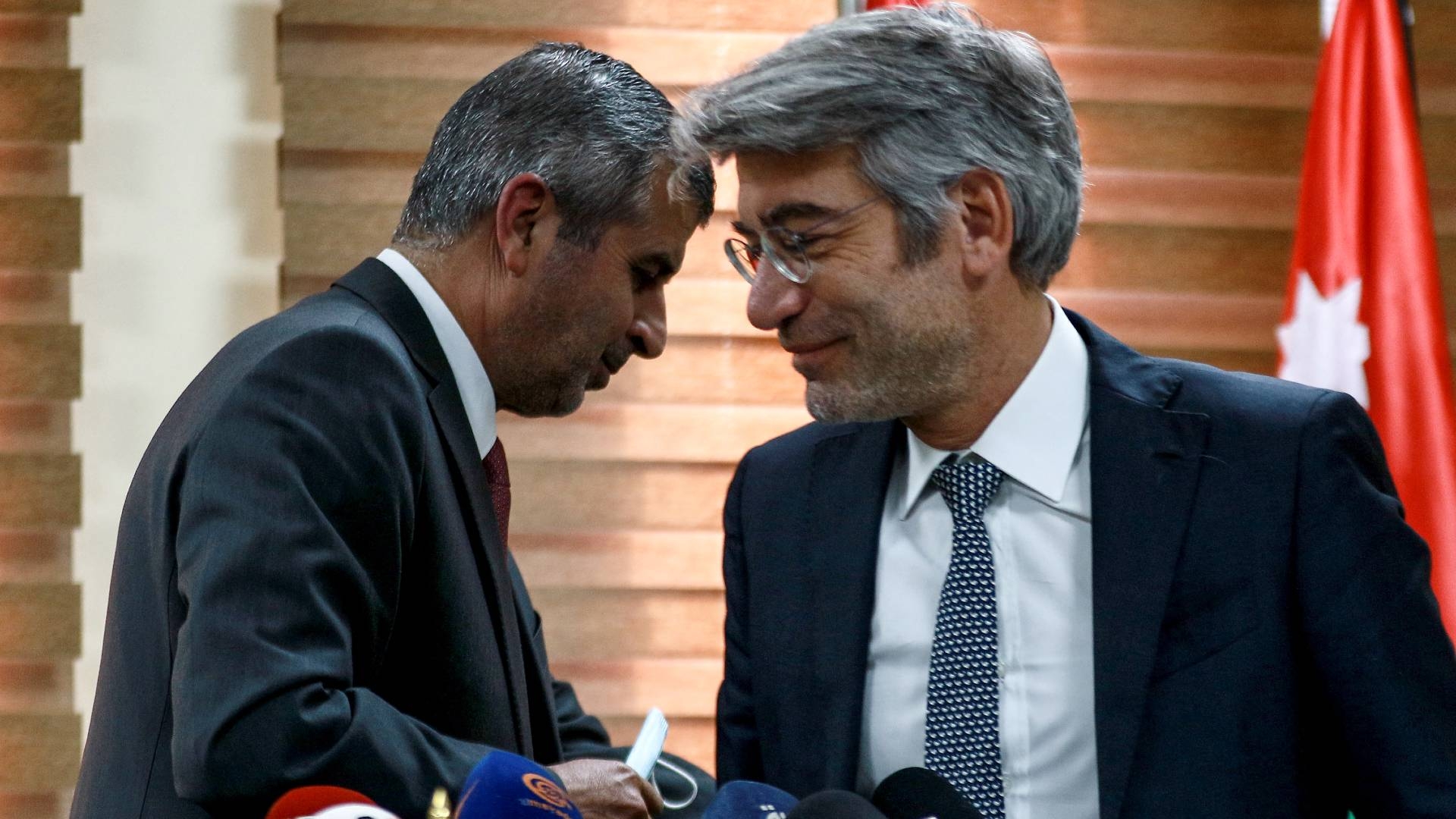
Amman wants to press ahead with its plan to route electricity produced in Jordan to Lebanon to help ease gruelling power cuts there, despite backlash from US Republicans who say the proposed deal would benefit President Bashar al-Assad of Syria, as the electricity would transit Syria.
Electricity from Jordan would greatly help Lebanon, Saleh Kharabsheh, Jordan's energy minister, told Middle East Eye, with the Mediterranean nation grappling with fuel and power shortages that have paralysed the economy and vital services, including hospitals.
"We are waiting for the World Bank to complete its financing operations with Lebanon," Kharabsheh said. "Once they get the final clearance from the US side, we are ready to start transmitting the electricity."
The US - whose Caesar sanctions target anyone attempting to engage in economic activities that might support the Assad government - had also negotiated a deal last year that would have seen Egyptian natural gas shipped to Lebanon via the Arab Gas pipeline, with Jordan and Syria as transit countries. The plan was intended to offer an alternative to a Hezbollah effort to transport Iranian fuel to the country.
But in recent months both deals have faced several hurdles, with leading Republican lawmakers in the US House and Senate foreign relations committees criticising the proposals, saying they would "undoubtedly enrich the Assad regime".
New MEE newsletter: Jerusalem Dispatch
Sign up to get the latest insights and analysis on Israel-Palestine, alongside Turkey Unpacked and other MEE newsletters
In January, Lebanese, Jordanian and Syrian officials signed the agreement for Jordan to supply Lebanon with 150 megawatts of electricity from midnight until 6am and 250 megawatts during the rest of the day, with Syria receiving eight percent of the energy transferred as "in-kind" payments.
To allow the transport of energy resources through Syria, the US confirmed Jordan and Egypt would not be affected by its Caesar sanctions, named after the defector who brought photographic evidence of Assad's brutal torture of civilians to the world.
'Jordan is still paying'
- Jawad al-Anani, former foreign minister to Jordan
In a letter sent to US Secretary of State Antony Blinken on 1 February, Senator Jim Risch, ranking member of the Senate Foreign Relations Committee, and Representative Michael McCaul, ranking member of the House Foreign Affairs Committee, expressed their "serious concern" that the agreement created "a blueprint for circumventing Caesar sanctions in the future", ultimately allowing Assad's "brutal war" to rage on.
US energy envoy Amos Hochstein noted last month that financing negotiations with the World Bank could conclude in a "matter of weeks". Egypt's Minister of Petroleum and Mineral Resources Tarek el-Molla set the date for exporting gas to Lebanon by mid-March at the latest.
With the region reeling from the coronavirus pandemic's economic repercussions, on top of ongoing conflict, cooperation between Arab countries is "in the interest of all", Kharabsheh noted during the electricity deal's January signing ceremony.
Jawad al-Anani, a former deputy prime minister and foreign minister of Jordan, echoed those remarks, telling MEE that it was crucial Washington approved the deal.
"We can see eye-to-eye with the United States on some of [Syria's] human rights violations, but what else can we do? This war has been raging inside Syria for the last 10 years and the country that has suffered the most is Jordan," Anani said.
Jordanian political analyst Amer Sabaileh told MEE that Amman "needs to diversify its sources of income and capitalise on its geographic position", referencing Syria's strategic and economic importance to Jordan before the war.
However, the resource-poor kingdom remains obliged to the demands of its donors, with the US at the top of the list.
The deal will not move forward without "an American and European blessing", said Sabaileh. "It needs a political umbrella to survive - and many political elements are still missing."
Iran and Russia
US pronouncements of support for the energy deal came weeks after Hezbollah leader Hassan Nasrallah announced Iran was sending shipments of fuel to Lebanon.
US Deputy Assistant Secretary of State Ethan Goldrich said last month that the situation in Lebanon was a cause for "concern", adding the "continued degradation" of Lebanon's economy may lead it to becoming a failed state.
"We cannot let this happen," he said, adding that the transfer of gas and electricity through Syria was "worth the risk".
The in-kind payments Syria will receive under the deal equate to around 22.5 MWh daily, enough to light roughly 22,500 homes, Jordanian economist and energy expert Amer Showbaki told MEE.
Syrian political economist Karam Shaar said the deal's benefits for Syria's electricity sector were "very tangible" and would provide roughly five percent of electricity needs in government-held areas.
"Politically, the benefits are basically related to messaging," Shaar told MEE. "The Assad regime will be able to tell neighbouring countries and investors abroad that normalisation is underway."
However, as Russia's invasion of Ukraine unfolds, Assad's calls for stability and normalisation will not easily slide past Washington's tightened scrutiny.
Russia has signed "numerous" memoranda of understanding and binding contracts with Syria over investments in the gas sector, noted Shaar. They are a way for Russia to "put its hands on those investments, hoping that when a political settlement comes, they can capitalise on them".
The Russian company Stroytransgaz is a contractor working on Syria's segment of the Arab Gas Pipeline (AGP), which has been rehabilitated to transport Egyptian gas under the deal.
With the Russia-Ukraine war ongoing, the US will likely be more hesitant to support the deal, given its possible handouts to Russian gas interests, such as Stroytransgaz, in Syria. Western countries may also stop neighbouring countries from normalising relations with the Assad government, Shaar added.
"Whatever leverage the US has, probably, they would like to use it to squeeze Russia out of Syria," Anani told MEE. While today it is still unclear how this scenario might play out, "Jordan will have to comply", he added.
Steps towards Syria-Jordan friendship?
When the energy deal was initially put on the table, King Abdullah's relationship with the Assad government seemed to be "on a fast track" towards normalisation, noted political analyst Sabaileh.
The king fully opened Jordan's main border crossing with Syria in late September, and days later received his first call from the Syrian president in more than a decade.
The deal is 'a win-win'
- Rund Awwad, engineer
In the face of unprecedented unemployment rates, King Abdullah's efforts to ease tensions with Jordan's neighbour have become increasingly important to revive Amman's beleaguered economy.
Before the war, Syria had long served as a critical transit route, connecting Jordan to the Lebanese market, as well as Turkey and Eastern Europe.
"We have deep and tangible interests in our relationship with Syria and using Syrian territory to reach other destinations," noted Anani. "The deal will normalise our relations. It will help Lebanon and Jordan."
However, the seemingly fast pace of Jordan's normalisation with Syria has "started to slow down", said Sabaileh. The Syrian border has become an increasing threat to Jordan’s national security, he said.
The Jordanian Armed Forces (JAF) recently reported a "dramatic" increase in drug smuggling attempts, resulting in confrontations that left a JAF officer dead and multiple soldiers injured.
"I was expecting a greater political alliance [from Syria], or at least respect to Jordanian sovereignty," Sabaileh said.
He noted that the Russian escalation would only add another obstacle to the kingdom's efforts to normalise relations with Syria, backtracking on what seemed like positive steps last autumn.
Gas normalisation
Nearly all of the electricity Jordan will send to Lebanon is produced using Israeli gas, multiple energy experts told MEE. However, there has been little objection or discussion about the role of Israeli resources in the energy deal.
Rund Awwad, an engineer specialising in renewable energy in Jordan, noted that natural gas accounted for 80 percent of the energy used for the country's power generation, citing the energy ministry's yearly report.
Given this, and considering Jordan's daily consumption of natural gas is equal to 337 MCF (9.5 MCM) and Jordan's deal with Israel stands at 45 BCM for the next 15 years, "almost 100 percent of the imported natural gas from Israel will be used for power generation", she noted.
"Right now, Jordan's natural gas is all from Israel," said Raed al-Araj, CEO of Houmam Energy and Water Services, who has more than 30 years of experience in Jordan's energy sector. Araj noted Jordan's domestic production of natural gas only accounted for seven to eight percent of the total consumption.
Despite the amount of Israeli gas playing a role in the energy deal, "we haven't heard serious objections to this from Lebanon or Syria", said Sabaileh.
"If it is well known, and still the Lebanese and Syrians are still going on with the deal, of course we can see a change that this kind of normalisation interaction with Israel is not a taboo," he added.
"This is what I call the gas normalisation of relations."
Economic benefits, political costs
Although the energy deal will serve the interests of several regional players, it cannot detach itself from the political strings of deeply invested global powers.
Araj noted that Jordan's electrical grid could handle pushing up to 500MW through Syria's grid daily - double the amount specified in the deal. But the Caesar sanctions limit the extent to which Jordan can cooperate with Syria in the energy and infrastructure sectors, said Araj, referencing the lost potential in these "key" sectors.
"An exclusion of the Caesar Act for Jordan would help the Jordanian economy," he stated.
"The deal is great for all the parties, it will help the political relationships and contribute to prosperity for all. It's a win-win," Awwad said.
The Jordanian energy minister said the deal was "not something new", noting the kingdom's long history of electricity exchange with Syria before the crises.
The Syrian war closed one of the kingdom's vital doors for economic exchange, disrupting a flourishing trade network and forced millions to flee the country; hundreds of thousands of people have sought refuge in Jordan. Nearly 10 years later, the Syrian crisis continues on, with no political resolution in the foreseeable future.
"Jordan is still paying," said Anani. "The world community is not compensating Jordan for all the losses it has been carrying."
With regards to the Syrian crisis, "the international community is not doing anything… no one is offering solutions", said Sabaileh. "But will this push Jordan to start thinking individually?
"For sure not, Jordan will never take a step without consultation with its allies, mainly the US."
Middle East Eye delivers independent and unrivalled coverage and analysis of the Middle East, North Africa and beyond. To learn more about republishing this content and the associated fees, please fill out this form. More about MEE can be found here.


